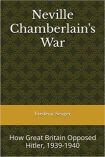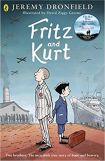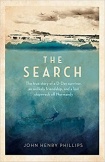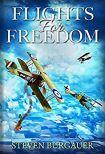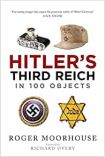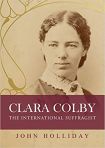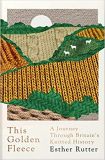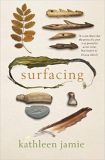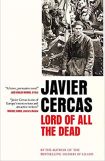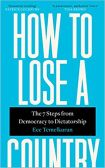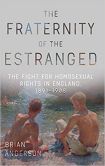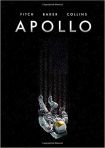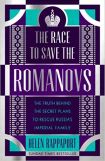Difference between revisions of "Newest History Reviews"
| (330 intermediate revisions by 4 users not shown) | |||
| Line 1: | Line 1: | ||
[[Category:History|*]] | [[Category:History|*]] | ||
| − | [[Category:New Reviews|History]] | + | [[Category:New Reviews|History]]__NOTOC__ <!-- INSERT NEW REVIEWS BELOW HERE--> |
| − | + | {{Frontpage | |
| − | __NOTOC__ | + | |isbn=1785633457 |
| − | {{ | + | |title=Charging Around: Exploring the Edges of England by Electric Car |
| − | | | + | |author=Clive Wilkinson |
| − | |title= | + | |rating=5 |
| − | |rating= | + | |genre=Travel |
| − | |genre= | + | |summary=Clive Wilkinson has a history of travelling by unconventional means with a preference for slow travel. As he neared his eightieth birthday the idea of exploring the edges of England in an electric car was not totally outrageous. In fact, it should be a pleasant holiday for Clive and his wife, Joan, shouldn't it? |
| − | |summary= | ||
| − | |||
}} | }} | ||
| − | + | {{Frontpage | |
| − | {{ | + | |isbn=B09BLBP3P8 |
| − | | | + | |title=Neville Chamberlain's War: How Great Britain Opposed Hitler, 1939-1940 |
| − | |title= | + | |author=Frederic Seager |
|rating=4.5 | |rating=4.5 | ||
|genre=History | |genre=History | ||
| − | |summary= | + | |summary=Received wisdom and simplified narrative often lead to misconceptions about history. One such is the scrubbing from the popular imagination of the early days of World War II from 1939-40, known as the ''Phoney War''. We remember Neville Chamberlain appeasing Hitler, war breaking out, and Churchill coming in to save the day. Very little time is spent on this period in cultural reflections and yet, as Frederic Seager argues in this book, it was of vital significance in how the war played out. |
| − | |||
| − | |||
| − | |||
| − | |||
| − | |||
| − | |||
| − | |||
| − | |||
| − | |||
| − | |||
}} | }} | ||
| − | + | {{Frontpage | |
| − | {{ | + | |isbn=3756228711 |
| − | | | + | |title=CDC: The happy years with a spectacular IT 'Phenomena' |
| − | |title= | + | |author=Hans Bodmer |
|rating=4 | |rating=4 | ||
| − | |||
| − | |||
| − | |||
| − | |||
| − | |||
| − | |||
| − | |||
| − | |||
| − | |||
| − | |||
| − | |||
| − | |||
| − | |||
| − | |||
| − | |||
| − | |||
| − | |||
| − | |||
|genre=History | |genre=History | ||
| − | |summary= | + | |summary=''The history of the development of IT could fill books of several hundred pages.'' |
| − | |||
| − | |||
| − | + | Author Hans Bodmer is quite right about that. He has chosen to tell us about the short, but explosive, history of the Control Data Company, CDC, for whom he worked. It's a fascinating tale, told in a mixture of technological summary and wry anecdote. | |
| − | |||
| − | |||
| − | |||
| − | |||
| − | |||
| − | |||
}} | }} | ||
| − | + | {{Frontpage | |
| − | {{ | + | |author=Jeremy Dronfield and David Ziggy Greene |
| − | |author= | + | |title=Fritz and Kurt |
| − | |title= | + | |rating=4 |
| − | |rating=4 | + | |genre=Confident Readers |
| − | |genre= | + | |summary=We start with the pair of brothers Fritz and Kurt, and their muckers, doing things any Jewish lad in 1930s Vienna would want to do – kicking things around the empty market place, helping the neighbours, being dutiful when it comes to the synagogue choir and at a vocational school. Kurt has to make sure the lamps are turned on at their very Orthodox neighbours' each Friday night – the Sabbath preventing them for using anything nearly as mechanical and workmanlike as a light switch. But this is the time just before the Austrian leader is going to cave to Hitler's will, and instead of having a national vote to keep the Nazis out, invite them in with open arms. ''Kristallnacht'' happened in Vienna just as much as in Germany, as did all the round-ups of Jews. These in their turn leave the younger Kurt at home with his mother and sisters anxious to hear word of an evacuation to Britain or the US, while Fritz and his father are, unknown initially to each other, packed off on the same train to Buchenwald and the stone quarry there. And us wondering how the titular event for the adult variant of all this could come about… |
| − | |summary= | + | |isbn=024156574X |
| − | | | ||
}} | }} | ||
| − | + | {{Frontpage | |
| − | {{ | + | |author=John Henry Phillips |
| − | |author= | + | |title=The Search |
| − | |title= | ||
|rating=5 | |rating=5 | ||
|genre=History | |genre=History | ||
| − | |summary= | + | |summary=Archaeology cannot be child's play, when you're scraping in the dirt looking to find what you can find, often knowing there should be something there but not always confident what. Archaeology must be a fair bit harder when you set out to find some specific thing. This book is a case of the latter, as our author promises to locate the topic of the titular search. And he really hasn't made it easy for himself – the search area is a wide one, the target might not exist any more – oh, and it's underwater, when he cannot dive. Latching on to a particular D-Day veteran through helping the heroic old man's visit back to France, our author has promised to find the landing craft that delivered him to Normandy, and that he was lucky to survive when it sank from beneath him. The secondary aim is to erect a memorial to everyone else aboard, the vast majority of whom perished. Who else would make such promises to someone in their nineties? |
| − | | | + | |isbn=1472146182 |
}} | }} | ||
| − | + | {{Frontpage | |
| − | {{ | + | |isbn= B09F4CTKJR |
| − | | | + | |title= Flights for Freedom |
| − | |title= | + | |author= Steven Burgauer |
|rating=4.5 | |rating=4.5 | ||
| − | |genre= | + | |genre=Historical Fiction |
| − | |summary= | + | |summary=It's the later stages of World War I and the United States has just entered the conflict. Petrol Petronus is a young American who has signed up and joined the 17 Aero Squadron. This company was the first US Aero Squadron to be trained in Canada, the first to be attached to the RAF and the first to be sent into the skies to fight the Germans in active combat. But before that can happen, Petrol has to master flying the notoriously difficult but majestic Sopwith Camel. |
| − | |||
| − | |||
| − | |||
| − | |||
| − | |||
| − | |||
| − | |||
| − | |||
| − | |||
| − | |||
| − | |||
| − | |||
| − | |||
| − | |||
| − | |||
| − | |||
| − | |||
| − | |||
| − | |||
}} | }} | ||
| − | + | {{Frontpage | |
| − | + | |isbn=0578761718 | |
| − | + | |title=The Inspiring History of a Special Relationship | |
| − | + | |author=Nancy Carver | |
| − | |||
| − | |||
| − | |||
| − | |||
| − | |||
| − | |||
| − | {{ | ||
| − | | | ||
| − | |title=The | ||
| − | |||
| − | |||
| − | |||
| − | |||
| − | |||
| − | |||
| − | |||
| − | |author= | ||
| − | |||
|rating=4.5 | |rating=4.5 | ||
|genre=History | |genre=History | ||
| − | |summary= | + | |summary=The church of St Mary Aldermanbuy had existed in the City of London from at least 1181, when it was first mentioned in records. Sadly, the original church was destroyed in the Great Fire of London in 1666. It was rebuilt in Portland stone from a design by Sir Christopher Wren soon after the fire and then survived for centuries until World War II, when it was again ruined by bombs during the Blitz. But that wasn't the end of its story: after a phenomenal fundraising effort, the stones from the church's walls were transported to Fulton, Missouri. There, in the grounds of Westminster College, the church was rebuilt and today serves as a memorial to Winston Churchill. |
| − | |||
}} | }} | ||
| − | + | {{Frontpage | |
| − | {{ | + | |isbn=1784385166 |
| − | | | + | |title=The Third Reich in 100 Objects: A Material History of Nazi Germany |
| − | |title= | + | |author=Roger Moorhouse |
|rating=5 | |rating=5 | ||
|genre=History | |genre=History | ||
| − | |summary= | + | |summary=What is the first image that comes to mind when you think of the Third Reich? Hitler? A swastika? The Nazi salute? The gate to a concentration camp? None of these are comfortable images but they are emblematic of the Third Reich's fascist regime in all its iniquity. But some objects and images from that time may be less familiar to you. In this short volume, Roger Moorhouse has attempted to illustrate the period of the Third Reich through one hundred of its material artefacts. |
| − | |||
}} | }} | ||
| − | + | {{Frontpage | |
| − | {{ | + | |author=Lun Zhang, Adrien Gombeaud, Ameziane and Edward Gauvin (translator) |
| − | |author= | + | |title=Tiananmen 1989: Our Shattered Hopes |
| − | |title= | ||
|rating=4.5 | |rating=4.5 | ||
| − | |genre= | + | |genre=Graphic Novels |
| − | |summary= | + | |summary=I never really followed the events of Tiananmen Square with much attention when it was playing out – someone in the second half of their teens has other priorities, you know. I certainly didn't know of the weeks of protests and hunger strikes from the students before the massacre and the birth of the Tank Man image, I didn't know how the area had long been a venue for political protest, and I didn't know more than a spit about the people involved on either side. This book is practically flawless in giving a general browser's context for the whole season of protests back in 1989. |
| − | | | + | |isbn=1684056993 |
}} | }} | ||
| − | + | {{Frontpage | |
| − | {{ | + | |isbn=0648684806 |
| − | | | + | |title=Clara Colby: The International Suffragist |
| − | |title= | + | |author=John Holliday |
| − | |rating=4 | + | |rating=4 |
|genre=Biography | |genre=Biography | ||
| − | |summary= | + | |summary=The path of Clara Dorothy Bewick's life was probably determined when her family emigrated to the USA. At the time she was just three-years-old but because of some childhood ailment, she wasn't allowed to sail with her parents and three brothers. Instead, she remained with her grandparents, who doted on her and saw that she received a good education, both in and out of school. She was the only child in the household and her childhood was glorious. By contrast, her family had become pioneer farmers in the mid-west of the United States and life was hard, as Clara was to find out when she and her grandparents eventually went to join the family. Clara would only know her mother for a few months: she was married for fifteen years, had ten pregnancies, seven surviving children and died in childbirth not long after Clara arrived. As the eldest girl, a heavy burden would fall on Clara and Wisconsin was a rude awakening. |
| − | |||
}} | }} | ||
| − | + | {{Frontpage | |
| − | {{ | + | |isbn=1783784350 |
| − | | | + | |title=This Golden Fleece: A Journey Through Britain's Knitted History |
| − | |title= | + | |author=Esther Rutter |
| − | |rating= | + | |rating=5 |
|genre=History | |genre=History | ||
| − | |summary= | + | |summary=It was December and Esther Rutter was stuck in her office job, writing to people she'd never met and preparing spreadsheets. The job frustrated her and even her knitting did not soothe her mind. January was going to be a time for making changes and she decided that she would travel the length and breadth of the British Isles with occasional forays abroad, discovering and telling the story of wool's history and how it had made and changed the landscape. She'd grown up on a sheep farm in Suffolk - '' a free-range child on the farm'' - and learned to spin, knit and weave from her mother and her mother's friend. This was in her blood. |
| − | |||
}} | }} | ||
| − | + | {{Frontpage | |
| − | {{ | + | |isbn=1789017977 |
| − | | | + | |title=Ronnie and Hilda's Romance: Towards a New Life after World War II |
| − | |title= | + | |author=Wendy Williams |
|rating=4 | |rating=4 | ||
|genre=History | |genre=History | ||
| − | |summary= | + | |summary=Ronnie Williams was the son of Thomas Henry Williams (known as Harry) and Ethel Wall. There's some doubt as to whether or not they were ever married or even Harry's birthdate: he claimed to have been born in 1863, but he was already many years older than Ethel and he might well have shaved a few years off his age. For a while the family was quite well-to-do but disaster struck in the 1929 Depression and five-year-old Ronnie had to adjust to a very different lifestyle. One thing he did inherit from his father was his need to be well-turned-out and this would stay with him throughout his life. He joined the army at eighteen in 1942. |
| − | |||
}} | }} | ||
| − | + | {{Frontpage | |
| − | {{ | + | |isbn=1980891117 |
| − | | | + | |title=G Engleheart Pinxit 1805: A year in the life of George Engleheart |
| − | |title=A | + | |author=John Webley |
|rating=4.5 | |rating=4.5 | ||
| − | |genre= | + | |genre=Art |
| − | |summary= | + | |summary=George Engleheart was one of the leading portrait miniaturists of Georgian London, with a career lasting from the 1770s to the Regency era. He was also one of the most prolific, painting nearly 5,000 miniatures altogether (over twenty of them being of King George III). Throughout most of that time he carefully recorded the names of each of his clients, and subsequently transcribed them into what is referred to as his fee book. |
| − | |||
}} | }} | ||
| − | + | {{Frontpage | |
| − | {{ | + | |isbn=1789016304 |
| − | | | + | |title=War and Love: A family's testament of anguish, endurance and devotion in occupied Amsterdam |
| − | |title= | + | |author=Melanie Martin |
| − | |rating= | + | |rating=5 |
|genre=History | |genre=History | ||
| − | |summary=A | + | |summary=Melanie Martin read about what happened to Dutch Jews in occupied Amsterdam during World War II and was entranced by what she discovered, particularly in ''The Diary of Ann Frank'' but then realised that her own family's stories were equally fascinating. A hundred and seven thousand Jews were deported from the city during the war years, but only five thousand survived and Martin could not understand how this could be allowed to happen in a country with liberal values who were resistant to German occupation. Most people believed that the occupation could never happen: even those who thought that the Germans might reach the city were convinced that they would soon be pushed back, that the Amsterdammers would never allow what happened to escalate in the way that it did, but initial protests melted away as the organisers became more circumspect. It's an atrocity on a vast scale but made up of tens of thousands of individual tragedies. |
| − | |||
}} | }} | ||
| − | + | {{Frontpage | |
| − | {{ | + | |isbn=1908745819 |
| − | | | + | |title=Surfacing |
| − | |title= | + | |author=Kathleen Jamie |
| − | |rating= | + | |rating=5 |
|genre=History | |genre=History | ||
| − | |summary= | + | |summary=Sometimes when people suggest that you read a certain book, they tell you ''this one has your name on it''. Mostly we take them at their word, or not, but rarely do we ask them why they thought so unless it turns out that we didn't like the book. That's a rare experience. People who are sensitive to hearing a book calling your name, rarely get it wrong. In this case, I was told why. The blurb speaks of the author considering ''an older, less tethered sense of herself.'' Older. Less tethered. That's not a bad description of where I am. Add to that my love of the natural world, of those aspects of the poetic and lyrical that are about style not form, and substance most of all, about connection. Of course, this book had my name on it. It was written for me. It would have found its way to me eventually. I am pleased to have it fall onto my path so quickly. |
| − | |||
| − | |||
| − | |||
| − | |||
| − | |||
| − | |||
| − | |||
| − | |||
| − | |||
| − | |||
}} | }} | ||
| − | + | {{Frontpage | |
| − | {{ | + | |isbn=0857058320 |
| − | | | + | |title=Lord Of All the Dead |
| − | |title= | + | |author=Javier Cercas and Anne McLean (translator) |
|rating=4 | |rating=4 | ||
|genre=History | |genre=History | ||
| − | |summary= | + | |summary=''Lord Of All the Dead'' is a journey to uncover the author's lost ancestor's life and death. Cercas is searching for the meaning behind his great uncle's death in the Spanish Civil War. Manuel Mena, Cercas' great uncle, is the figure who looms large over the book. He died relatively young whilst fighting for Francisco Franco's forces. Cercas ruminates on why his uncle fought for this dictator. The question at the centre of this book is whether it is possible for his great uncle to be a hero whilst having fought for the wrong side. |
| − | |||
}} | }} | ||
| − | + | {{Frontpage | |
| − | {{ | + | |isbn=0008294011 |
| − | | | + | |title=How to Lose a Country: The 7 Steps from Democracy to Dictatorship |
| − | |title=The | + | |author=Ece Temelkuran |
|rating=4.5 | |rating=4.5 | ||
|genre=History | |genre=History | ||
| − | |summary= | + | |summary=A little while ago a friend asked me if I thought that we were living through what in years to come would be discussed by A level history students when faced with the question ''Discuss the factors which led to...'' I agreed that she was right and wasn't certain whether it was a good or bad thing that we didn't know what all 'this' was leading to. I think now that I do know. We are in danger of losing democracy and whilst it's a flawed system I can't think of a better one, particularly as the 'benevolent dictator' is as rare as hen's teeth. |
| − | |||
}} | }} | ||
| − | + | {{Frontpage | |
| − | {{ | + | |isbn=1788037812 |
| − | | | + | |title=The Fraternity of the Estranged: The Fight for Homosexual Rights in England, 1891-1908 |
| − | |title=The | + | |author=Brian Anderson |
|rating=5 | |rating=5 | ||
| − | |||
| − | |||
| − | |||
| − | |||
| − | |||
| − | |||
| − | |||
| − | |||
| − | |||
| − | |||
| − | |||
| − | |||
| − | |||
| − | |||
| − | |||
| − | |||
| − | |||
| − | |||
| − | |||
| − | |||
| − | |||
| − | |||
| − | |||
| − | |||
| − | |||
| − | |||
| − | |||
| − | |||
| − | |||
| − | |||
| − | |||
| − | |||
| − | |||
| − | |||
| − | |||
| − | |||
|genre=History | |genre=History | ||
| − | |summary= | + | |summary=Originally passed in 1885, the law that had made homosexual relations a crime remained in place for 82 years. But during this time, restrictions on same-sex relationships did not go unchallenged. Between 1891 and 1908, three books on the nature of homosexuality appeared. They were written by two homosexual men: Edward Carpenter and John Addington Symonds, as well as the heterosexual Havelock Ellis. Exploring the margins of society and studying homosexuality was common on the European Continent, but barely talked about in the UK, so the publications of these men were hugely significant – contributing to the scientific understanding of homosexuality, and beginning the struggle for recognition and equality, leading to the milestone legalisation of same-sex relationships in 1967. |
| − | |||
}} | }} | ||
| − | + | {{Frontpage | |
| − | {{ | + | |isbn=1910593508 |
| − | | | + | |title=Apollo |
| − | |title= | + | |author=Matt Fitch, Chris Baker and Mike Collins |
|rating=5 | |rating=5 | ||
|genre=History | |genre=History | ||
| − | |summary= | + | |summary=This incredible graphic novel is a love letter to the Moon landings and the passion for the subject drips off every Apollo by Matt Fitch, Chris Baker and Mike Collins. This is a story we know well and because of this, the authors take a few narrative shortcuts knowing that we can fill in the blanks. These shortcuts are the only downside to the book. If you've ever read a comic book adaptation of a film you will be familiar with the slight feeling that there are scenes missing and that dialogue has been trimmed. This is a graphic novel that could easily have been three times as long and still felt too short. |
| − | |||
}} | }} | ||
| − | + | {{Frontpage | |
| − | {{ | + | |isbn=1786331047 |
| − | | | + | |title=The Race to Save the Romanovs: The Truth Behind the Secret Plans to Rescue Russia's Imperial Family |
| − | |title= | + | |author=Helen Rappaport |
| − | |||
| − | |||
| − | |||
| − | |||
| − | |||
| − | |||
| − | |||
| − | |||
| − | |||
| − | |||
| − | |||
| − | |||
| − | |||
| − | |||
| − | |||
| − | |||
| − | |||
| − | |author= | ||
| − | |||
|rating=5 | |rating=5 | ||
|genre=History | |genre=History | ||
| − | |summary= | + | |summary=The basic facts about the deaths of Nicholas and Alexandra, some of which were deliberately obscured at the time for various reasons, have long since been established. For the last few months of their lives in Russia the former Tsar and Tsarina, their children and few remaining servants were held in increasingly squalid, humiliating captivity. To prevent them from being rescued, in July 1918 the revolutionary regime had them all shot and bayoneted to death in circumstances which, once the news was confirmed beyond all doubt, horrified their relatives in Europe. |
| − | |||
}} | }} | ||
| − | + | Move on to [[Newest Home and Family Reviews]] | |
| − | |||
| − | |||
| − | |||
| − | |||
| − | |||
| − | |||
| − | |||
Latest revision as of 12:03, 20 March 2023
Review ofCharging Around: Exploring the Edges of England by Electric Car by Clive WilkinsonClive Wilkinson has a history of travelling by unconventional means with a preference for slow travel. As he neared his eightieth birthday the idea of exploring the edges of England in an electric car was not totally outrageous. In fact, it should be a pleasant holiday for Clive and his wife, Joan, shouldn't it? Full Review |
Review ofNeville Chamberlain's War: How Great Britain Opposed Hitler, 1939-1940 by Frederic SeagerReceived wisdom and simplified narrative often lead to misconceptions about history. One such is the scrubbing from the popular imagination of the early days of World War II from 1939-40, known as the Phoney War. We remember Neville Chamberlain appeasing Hitler, war breaking out, and Churchill coming in to save the day. Very little time is spent on this period in cultural reflections and yet, as Frederic Seager argues in this book, it was of vital significance in how the war played out. Full Review |
Review ofCDC: The happy years with a spectacular IT 'Phenomena' by Hans BodmerThe history of the development of IT could fill books of several hundred pages. Author Hans Bodmer is quite right about that. He has chosen to tell us about the short, but explosive, history of the Control Data Company, CDC, for whom he worked. It's a fascinating tale, told in a mixture of technological summary and wry anecdote. Full Review |
Review ofFritz and Kurt by Jeremy Dronfield and David Ziggy GreeneWe start with the pair of brothers Fritz and Kurt, and their muckers, doing things any Jewish lad in 1930s Vienna would want to do – kicking things around the empty market place, helping the neighbours, being dutiful when it comes to the synagogue choir and at a vocational school. Kurt has to make sure the lamps are turned on at their very Orthodox neighbours' each Friday night – the Sabbath preventing them for using anything nearly as mechanical and workmanlike as a light switch. But this is the time just before the Austrian leader is going to cave to Hitler's will, and instead of having a national vote to keep the Nazis out, invite them in with open arms. Kristallnacht happened in Vienna just as much as in Germany, as did all the round-ups of Jews. These in their turn leave the younger Kurt at home with his mother and sisters anxious to hear word of an evacuation to Britain or the US, while Fritz and his father are, unknown initially to each other, packed off on the same train to Buchenwald and the stone quarry there. And us wondering how the titular event for the adult variant of all this could come about… Full Review |
Review ofThe Search by John Henry PhillipsArchaeology cannot be child's play, when you're scraping in the dirt looking to find what you can find, often knowing there should be something there but not always confident what. Archaeology must be a fair bit harder when you set out to find some specific thing. This book is a case of the latter, as our author promises to locate the topic of the titular search. And he really hasn't made it easy for himself – the search area is a wide one, the target might not exist any more – oh, and it's underwater, when he cannot dive. Latching on to a particular D-Day veteran through helping the heroic old man's visit back to France, our author has promised to find the landing craft that delivered him to Normandy, and that he was lucky to survive when it sank from beneath him. The secondary aim is to erect a memorial to everyone else aboard, the vast majority of whom perished. Who else would make such promises to someone in their nineties? Full Review |
Review ofFlights for Freedom by Steven BurgauerIt's the later stages of World War I and the United States has just entered the conflict. Petrol Petronus is a young American who has signed up and joined the 17 Aero Squadron. This company was the first US Aero Squadron to be trained in Canada, the first to be attached to the RAF and the first to be sent into the skies to fight the Germans in active combat. But before that can happen, Petrol has to master flying the notoriously difficult but majestic Sopwith Camel. Full Review |
Review ofThe Inspiring History of a Special Relationship by Nancy CarverThe church of St Mary Aldermanbuy had existed in the City of London from at least 1181, when it was first mentioned in records. Sadly, the original church was destroyed in the Great Fire of London in 1666. It was rebuilt in Portland stone from a design by Sir Christopher Wren soon after the fire and then survived for centuries until World War II, when it was again ruined by bombs during the Blitz. But that wasn't the end of its story: after a phenomenal fundraising effort, the stones from the church's walls were transported to Fulton, Missouri. There, in the grounds of Westminster College, the church was rebuilt and today serves as a memorial to Winston Churchill. Full Review |
Review ofThe Third Reich in 100 Objects: A Material History of Nazi Germany by Roger MoorhouseWhat is the first image that comes to mind when you think of the Third Reich? Hitler? A swastika? The Nazi salute? The gate to a concentration camp? None of these are comfortable images but they are emblematic of the Third Reich's fascist regime in all its iniquity. But some objects and images from that time may be less familiar to you. In this short volume, Roger Moorhouse has attempted to illustrate the period of the Third Reich through one hundred of its material artefacts. Full Review |
Review ofTiananmen 1989: Our Shattered Hopes by Lun Zhang, Adrien Gombeaud, Ameziane and Edward Gauvin (translator)I never really followed the events of Tiananmen Square with much attention when it was playing out – someone in the second half of their teens has other priorities, you know. I certainly didn't know of the weeks of protests and hunger strikes from the students before the massacre and the birth of the Tank Man image, I didn't know how the area had long been a venue for political protest, and I didn't know more than a spit about the people involved on either side. This book is practically flawless in giving a general browser's context for the whole season of protests back in 1989. Full Review |
Review ofClara Colby: The International Suffragist by John HollidayThe path of Clara Dorothy Bewick's life was probably determined when her family emigrated to the USA. At the time she was just three-years-old but because of some childhood ailment, she wasn't allowed to sail with her parents and three brothers. Instead, she remained with her grandparents, who doted on her and saw that she received a good education, both in and out of school. She was the only child in the household and her childhood was glorious. By contrast, her family had become pioneer farmers in the mid-west of the United States and life was hard, as Clara was to find out when she and her grandparents eventually went to join the family. Clara would only know her mother for a few months: she was married for fifteen years, had ten pregnancies, seven surviving children and died in childbirth not long after Clara arrived. As the eldest girl, a heavy burden would fall on Clara and Wisconsin was a rude awakening. Full Review |
Review ofThis Golden Fleece: A Journey Through Britain's Knitted History by Esther RutterIt was December and Esther Rutter was stuck in her office job, writing to people she'd never met and preparing spreadsheets. The job frustrated her and even her knitting did not soothe her mind. January was going to be a time for making changes and she decided that she would travel the length and breadth of the British Isles with occasional forays abroad, discovering and telling the story of wool's history and how it had made and changed the landscape. She'd grown up on a sheep farm in Suffolk - a free-range child on the farm - and learned to spin, knit and weave from her mother and her mother's friend. This was in her blood. Full Review |
Review ofRonnie and Hilda's Romance: Towards a New Life after World War II by Wendy WilliamsRonnie Williams was the son of Thomas Henry Williams (known as Harry) and Ethel Wall. There's some doubt as to whether or not they were ever married or even Harry's birthdate: he claimed to have been born in 1863, but he was already many years older than Ethel and he might well have shaved a few years off his age. For a while the family was quite well-to-do but disaster struck in the 1929 Depression and five-year-old Ronnie had to adjust to a very different lifestyle. One thing he did inherit from his father was his need to be well-turned-out and this would stay with him throughout his life. He joined the army at eighteen in 1942. Full Review |
Review ofG Engleheart Pinxit 1805: A year in the life of George Engleheart by John WebleyGeorge Engleheart was one of the leading portrait miniaturists of Georgian London, with a career lasting from the 1770s to the Regency era. He was also one of the most prolific, painting nearly 5,000 miniatures altogether (over twenty of them being of King George III). Throughout most of that time he carefully recorded the names of each of his clients, and subsequently transcribed them into what is referred to as his fee book. Full Review |
Review ofWar and Love: A family's testament of anguish, endurance and devotion in occupied Amsterdam by Melanie MartinMelanie Martin read about what happened to Dutch Jews in occupied Amsterdam during World War II and was entranced by what she discovered, particularly in The Diary of Ann Frank but then realised that her own family's stories were equally fascinating. A hundred and seven thousand Jews were deported from the city during the war years, but only five thousand survived and Martin could not understand how this could be allowed to happen in a country with liberal values who were resistant to German occupation. Most people believed that the occupation could never happen: even those who thought that the Germans might reach the city were convinced that they would soon be pushed back, that the Amsterdammers would never allow what happened to escalate in the way that it did, but initial protests melted away as the organisers became more circumspect. It's an atrocity on a vast scale but made up of tens of thousands of individual tragedies. Full Review |
Review ofSurfacing by Kathleen JamieSometimes when people suggest that you read a certain book, they tell you this one has your name on it. Mostly we take them at their word, or not, but rarely do we ask them why they thought so unless it turns out that we didn't like the book. That's a rare experience. People who are sensitive to hearing a book calling your name, rarely get it wrong. In this case, I was told why. The blurb speaks of the author considering an older, less tethered sense of herself. Older. Less tethered. That's not a bad description of where I am. Add to that my love of the natural world, of those aspects of the poetic and lyrical that are about style not form, and substance most of all, about connection. Of course, this book had my name on it. It was written for me. It would have found its way to me eventually. I am pleased to have it fall onto my path so quickly. Full Review |
Review ofLord Of All the Dead by Javier Cercas and Anne McLean (translator)Lord Of All the Dead is a journey to uncover the author's lost ancestor's life and death. Cercas is searching for the meaning behind his great uncle's death in the Spanish Civil War. Manuel Mena, Cercas' great uncle, is the figure who looms large over the book. He died relatively young whilst fighting for Francisco Franco's forces. Cercas ruminates on why his uncle fought for this dictator. The question at the centre of this book is whether it is possible for his great uncle to be a hero whilst having fought for the wrong side. Full Review |
Review ofHow to Lose a Country: The 7 Steps from Democracy to Dictatorship by Ece TemelkuranA little while ago a friend asked me if I thought that we were living through what in years to come would be discussed by A level history students when faced with the question Discuss the factors which led to... I agreed that she was right and wasn't certain whether it was a good or bad thing that we didn't know what all 'this' was leading to. I think now that I do know. We are in danger of losing democracy and whilst it's a flawed system I can't think of a better one, particularly as the 'benevolent dictator' is as rare as hen's teeth. Full Review |
Review ofThe Fraternity of the Estranged: The Fight for Homosexual Rights in England, 1891-1908 by Brian AndersonOriginally passed in 1885, the law that had made homosexual relations a crime remained in place for 82 years. But during this time, restrictions on same-sex relationships did not go unchallenged. Between 1891 and 1908, three books on the nature of homosexuality appeared. They were written by two homosexual men: Edward Carpenter and John Addington Symonds, as well as the heterosexual Havelock Ellis. Exploring the margins of society and studying homosexuality was common on the European Continent, but barely talked about in the UK, so the publications of these men were hugely significant – contributing to the scientific understanding of homosexuality, and beginning the struggle for recognition and equality, leading to the milestone legalisation of same-sex relationships in 1967. Full Review |
Review ofApollo by Matt Fitch, Chris Baker and Mike CollinsThis incredible graphic novel is a love letter to the Moon landings and the passion for the subject drips off every Apollo by Matt Fitch, Chris Baker and Mike Collins. This is a story we know well and because of this, the authors take a few narrative shortcuts knowing that we can fill in the blanks. These shortcuts are the only downside to the book. If you've ever read a comic book adaptation of a film you will be familiar with the slight feeling that there are scenes missing and that dialogue has been trimmed. This is a graphic novel that could easily have been three times as long and still felt too short. Full Review |
Review ofThe Race to Save the Romanovs: The Truth Behind the Secret Plans to Rescue Russia's Imperial Family by Helen RappaportThe basic facts about the deaths of Nicholas and Alexandra, some of which were deliberately obscured at the time for various reasons, have long since been established. For the last few months of their lives in Russia the former Tsar and Tsarina, their children and few remaining servants were held in increasingly squalid, humiliating captivity. To prevent them from being rescued, in July 1918 the revolutionary regime had them all shot and bayoneted to death in circumstances which, once the news was confirmed beyond all doubt, horrified their relatives in Europe. Full Review |
Move on to Newest Home and Family Reviews

